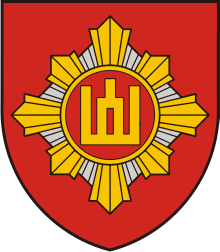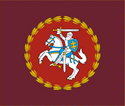
The Lithuanian Armed Forces are the military of Lithuania. The Lithuanian Armed Forces consist of the Lithuanian Land Forces, the Lithuanian Naval Force, the Lithuanian Air Force and the Lithuanian Special Operations Force. In wartime, the Lithuanian State Border Guard Service becomes part of the Lithuanian Armed Forces. A special security department handles VIP protection and communications security.
Military justice is the body of laws and procedures governing members of the armed forces. Many nation-states have separate and distinct bodies of law that govern the conduct of members of their armed forces. Some states use special judicial and other arrangements to enforce those laws, while others use civilian judicial systems. Legal issues unique to military justice include the preservation of good order and discipline, the legality of orders, and appropriate conduct for members of the military. Some states enable their military justice systems to deal with civil offenses committed by their armed forces in some circumstances.

Military police (MP) are law enforcement agencies connected with, or part of, the military of a state. In wartime operations, the military police may support the main fighting force with force protection, convoy security, screening, rear reconnaissance, logistic traffic management, counterinsurgency, and detainee handling.
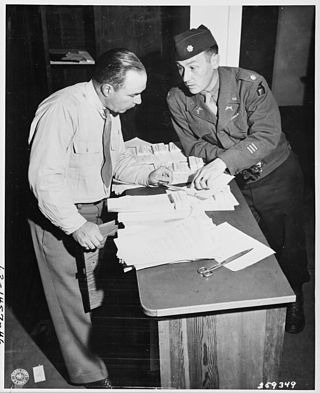
Provost marshal is a title given to a person in charge of a group of Military Police (MP). The title originated with an older term for MPs, provosts, from the Old French prévost. While a provost marshal is now usually a senior commissioned officer, they may be a person of any rank who commands any number of MPs; historically, the title was sometimes applied to civilian officials, especially under conditions of martial law, or when a military force had day-to-day responsibility for some or all aspects of civilian law enforcement. A provost marshal may also oversee security services, imprisonment, fire/emergency services and ambulances.
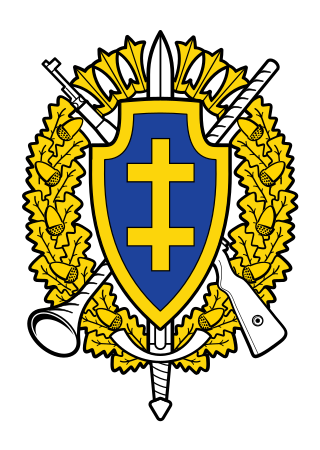
The Lithuanian Riflemen's Union, also referred to as Šauliai, is a paramilitary non-profit organization supported by the Government of Lithuania, that is active in three main areas: military training, sport, and culture, but this differs between peace and wartime.

The June Uprising was a brief period in the history of Lithuania between the first Soviet occupation and the Nazi occupation in late June 1941. Approximately one year earlier, on June 15, 1940, the Red Army occupied Lithuania and established the unpopular Lithuanian Soviet Socialist Republic, which used political repression and state terrorism to silence its critics and suppress resistance. When Nazi Germany attacked the Soviet Union on June 22, 1941, the Lithuanians rose up, declared renewed independence, and formed the short-lived Provisional Government. Insurgents took two large Lithuanian cities, Kaunas and Vilnius, even before the Wehrmacht arrived. Within a week, the German Army had control of the whole of Lithuania and had killed a stunning number of its citizens. The Lithuanians greeted the Germans as liberators from the repressive Soviet rule and hoped that the Germans would re-establish their independence or at least allow some degree of autonomy. No such support came from the Nazis, who steadily replaced Lithuanian institutions with their own administration. The Reichskommissariat Ostland was established at the end of July 1941. Deprived of any real power, the Provisional Government disbanded itself on August 5.

The January Events were a series of violent confrontations between the civilian population of Lithuania, supporting independence, and the Soviet Armed Forces. The events took place between 11 and 13 January 1991, after the restoration of independence by Lithuania. As a result of the Soviet military actions, 14 civilians were killed and over 140 were injured. 13 January, was the most violent day. The events were primarily centered in the capital city Vilnius, but Soviet military activity and confrontations also occurred elsewhere in the country, including Alytus, Šiauliai, Varėna and Kaunas.

Mechanized Infantry Brigade "Iron Wolf" is the core unit of the Lithuanian Army and forms the country's contribution to NATO collective defence. The name of the brigade relates to the Lithuanian mythical character from the medieval foundation legend of the Vilnius city.

Provosts are military police (MP) whose duties are policing solely within the armed forces of a country, as opposed to gendarmerie duties in the civilian population. However, many countries use their gendarmerie for provost duties.
Law enforcement in Spain is carried out by numerous organizations, not all of which operate in the same areas.
Law enforcement in Albania is the responsibility of several agencies. The responsibility for most tasks lies with the Albanian State Police, a national police agency, which is under the authority of Ministry of Internal Affairs. Examples of other agencies with limited policing powers are the Municipal Police, which has administrative functions and operates in the local level. They are controlled by mayors.

The following outline is provided as an overview of and topical guide to Lithuania:

The Lithuanian Land Forces (LLF) form the backbone of the Lithuanian Armed Forces, capable of acting as an integral part of NATO forces. Lithuanian Land Forces consist of three brigades, the Engineer Battalion, and the National Defence Volunteers Division.

The National Defence Volunteer Forces or NDVF is a branch of the Lithuanian Armed Forces. Volunteer forces were officially established on 17 January 1991 by the law of the Supreme Council of Lithuania on the National Defence Volunteer Service providing basis for establishing Voluntary National Defence Service. This decision made legal already existing volunteer formations that began appearing as early as 1990. Voluntary National Defence Service was reorganised into the National Defence Volunteer Force. In 2003 Volunteer Force was integrated into the Lithuanian Land Force. Tasks of volunteer soldiers were inevitably altered when Lithuania became a full-fledged member of NATO: approach of territorial defence was changed into territorial defence and training of modern active reserve. There are around 5000 volunteers and around 800 professional soldiers in the force.
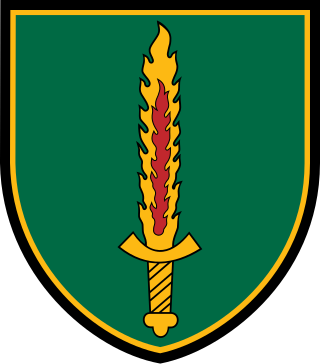
The Lithuanian Special Operations Force (LITHSOF) (Lithuanian: Lietuvos Specialiųjų Operacijų Pajėgos) is a special operation unit of the Lithuanian Armed Forces, formed exclusively of carefully selected, motivated and specially trained professionals. The main tasks of the Special Operations Force are counter terrorism, special reconnaissance, and hostage rescue.
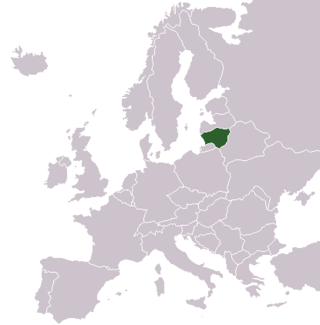
The following is an alphabetical list of articles related to Lithuania.
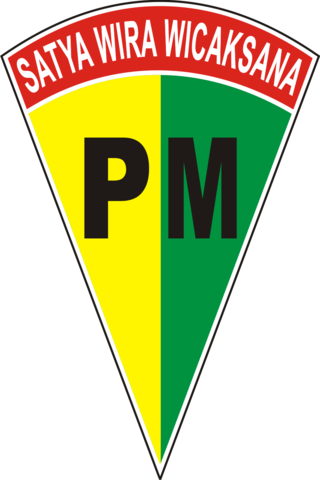
Puspomad or Army Military Police Center, which all of its personnel are part of the Military Police Corps (CPM) is one of the military general technical functions of the Indonesian Army which has the role for administering administrative assistance and as embodiment and guidance through the operation of Military Police functions. Its duties is basically to execute law enforcement towards the military which includes investigation activities and other policing duties within the scope of the army.

Stasys Pundzevičius was a Lithuanian division general, lecturer. He held high-ranking military positions in the interwar Lithuania: Chief of the Lithuanian Air Force, Chief of the General Staff, multiple times temporarily was the Chief of the Lithuanian Armed Forces, and was assigned Chief of the Lithuanian Armed Forces by the Provisional Government of Lithuania during the June Uprising in Lithuania.
The National coat of arms of Lithuania is a mounted armoured knight holding a sword and shield, known as Vytis. Since the early 15th century, it has been Lithuania's official coat of arms and is one of the oldest European coats of arms. The coat of arms features a red field with a white (silver) armoured knight on a white (silver) horse holding in his right hand a white (silver) sword above his head.
